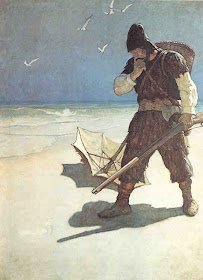One freezing cold windy afternoon around Christmas time (Dec 2000), I take the subway to Harvard Square in Cambridge, Boston. Freezing cold windy afternoons usually find me inside heated houses remembering the warmth of the Indian sun and its people. This afternoon, I brave it all in layers of sweaters and caps and socks, the cold still cutting through the skin of my soul, because at The Coop bookstore, I had seen a notice about a storytelling session.
I find my way up to the second floor landing. There is a small group sitting on sofas chatting and nursing hot cups of coffee. I take my place among this group of strangers. And then comes the storyteller, a man in his forties perhaps, big warm smile, books in his hands. And without much ado, he starts reading Christmas stories to this motley group of adults, of different nationalities, most of us strangers to each other.
And we listen to Truman Capote's A Child's Christmas, a story about a young boy's memories of Christmases with a crazy old aunt, his best friend. Christmases going into the woods to find the perfect Christmas tree, and baking cakes for all the people who have been good to them, like the bus driver who went out of his way to drop them, and all the people who were spending Christmas alone.
And then a story by Dylan Thomas about childhood memories of Christmas in Wales. Within no time, we are feeling the snow crunch under our feet in bright fir-lined countrysides. Listening to the sound of logs crackling in warm fireplaces. Smelling fresh plum cakes just taken out of ovens. Tasting heady wine. And raising a toast to the spirit of Christmas - the spirit of forgiveness, renewal, and everlasting compassion in the face of all dryness, indifference, and betrayal.
When the one and a half hour session is over, there is a pause before everyone bursts into applause. And then people smile and laugh, tears in their eyes, and look at each other with warmth, and oddly, no one seems that foreign anymore.
As a French storyteller told during a session here last month, stories are not just meant to make little children sleep, but to make grownups think. And perhaps feel again what we lose touch with, in our haste to fit in with the world's definitions of success.
Stepping out into the darkness, the cold no longer seems so terrible. I stop to watch a group of youngsters doing a rap song and dance on the footpath to make money "to go perform in New York", a handwritten board says. Pretty weak performance by all standards, but I put some money in their collection box with a smile, so what if they just make it to the nearest pub and have a jolly good time - youth and laughter and joyful winter evenings rubbing shoulders with friends are still wonderful things in our fragile lives, and therefore causes worth supporting :)
The cold returns to us every year from the faraway places it goes to during the summer, to remind us how precious warmth is in all its forms, and how it must be created and preserved for our sustenance and continuance, now and forever.
(originally written as Editorial for 'Winter Solstice', the winter edition of the office newsletter Oct '03)
 "The day, when it is established, is barely noticed in itself; continuous interests claim us; only if there is a dramatic thunderstorm, a blizzard or a partial eclipse of the sun may we momentarily forget the pursuit of our own life.
"The day, when it is established, is barely noticed in itself; continuous interests claim us; only if there is a dramatic thunderstorm, a blizzard or a partial eclipse of the sun may we momentarily forget the pursuit of our own life.


















